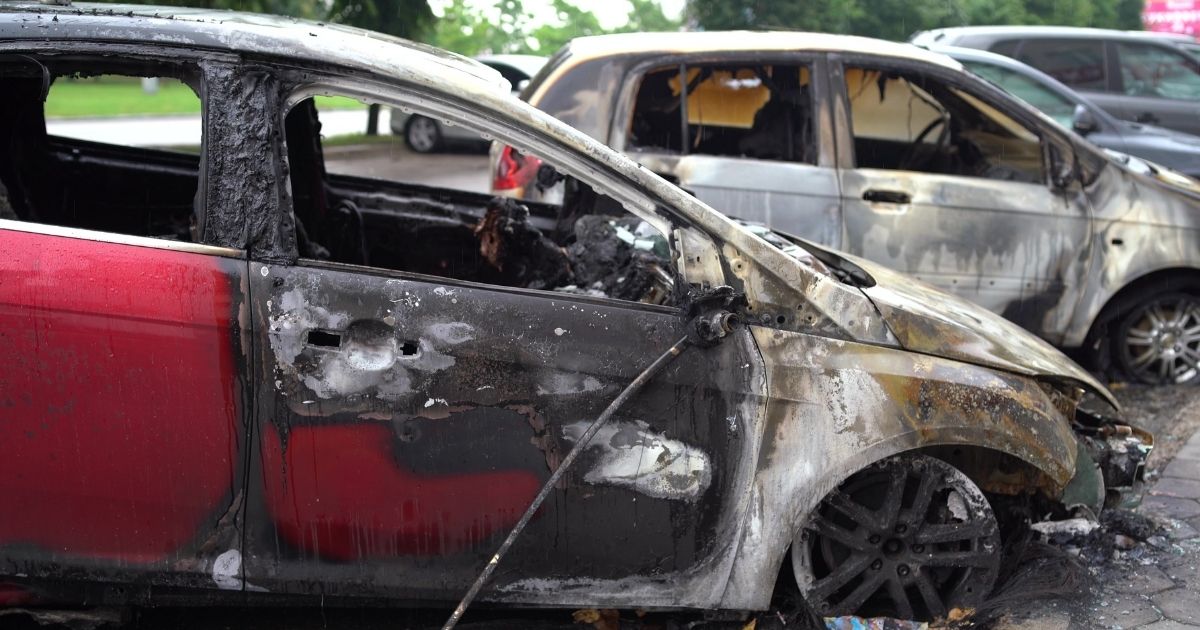Car fires are more frequent than many people realize. Car accidents and even auto issues can trigger fires. Motor vehicles collisions are the top cause of deaths from vehicle fires. Crashes often cause damage that sparks a fire, but there are many other causes that do not involve an impact or collision.
Vehicle fires can start under the hood, in the steer well, near the tires or brakes, among the dashboard’s electrical components, and even in the cabin of the car. Fires in the cabin are extremely dangerous for drivers and passengers, but fires in any part of the car pose life-threatening hazards.
In 2018, the U.S. Fire Administration released data about the main causes of car fires. According to the data, almost one-quarter of car fires started because of equipment failures and malfunctioning heat sources. About two in three car fires were started because of mechanical or electrical problems that caused a spark and flames that engulfed the entire car. These issues can stem from a car manufacturer’s faulty design, a defective car part, or from poor maintenance.
Additionally, more than one-third of car fires are caused by the negligence of drivers and accidents. Traveling with flammable materials or open flames, such as a burning cigarette, can pose obvious dangers as well. These practices are responsible for about seven percent of fires.
Car crashes can cause damage to delicate car systems, such as the electrical or fuel systems. Some of the main sources of vehicle fires also include the following:
- Heat sources, such as powered equipment, engine parts, drive-train elements.
- Sparks, friction, or electrical arcs.
- Fuel leaks from tanks or lines.
- Other leaks, such as oil or other flammable materials.
- Electrical system problems.
- Faulty wiring.
- Engine failures.
- Battery issues.
- Airbag mechanical issues.
- Flammable or combustible materials.
What Types of Damages are Caused by Car Fires?
In addition to catastrophic burn injuries, disfigurement, amputation, and severe tissue and nerve damage, car fires present other dangers as well. On top of smoke inhalation and high temperatures, exposure to toxic fumes and other breathable substances can cause lung issues. Explosions can cause dangerous flying debris as well. This flying debris can cause serious cuts and lacerations, which can also lead to infection if not properly cared for.
All of these injuries can be life-altering, which is why it is always important to seek medical help after a car fire. Getting immediate help will help reduce complications.
How Common are Vehicle Fires in the United States?
In 2018, vehicle fires were the second most common cause of fire fatalities in the United States, according to the National Fire Protection Association (NFPA). Behind only residential fires in single-family households and two-family homes, fires that took place in motor vehicles claimed the lives of 560 people and injured more than 1,500 civilians. The NFPA data shows that approximately 212,500 vehicle fires in 2018 resulted in $1.9 billion in direct property damage.
Statista, a global business data platform, reported that 189,500 highway vehicle fires in the U.S occurred in 2019. This data included fires that involved all types of vehicles that are normally used on highways, including cars, buses, trucks, and trailers.
What are Some Warning Signs?
There are a few tell-tale signs that indicate a car is in danger of a potential vehicle fire. Car owners should keep an eye out for these situations and have them remedied as soon as possible:
- Electrical fuses that blow repeatedly.
- Oil drips that leave a mess after an oil change.
- Fluid leaks.
- Damaged, cracked, and exposed metal.
- Broken or loose wires.
- Broken or loose hoses.
- Worrisome noises from the exhaust system.
- Inconsistencies in fuel and oil levels.
- Unexplained engine temperature changes.
- Loose or a missing oil cap.
What are Some Tips to Prevent a Car Fire?
Vehicle owners that take good care of their vehicles are in the best position to avoid car fires. In addition to recognizing the dangers, causes, and signs of vehicle fires, the NFPA offers the following tips to prevent car fires:
- See that the vehicle receives regular maintenance by a certified mechanic.
- Address any fluid leaks.
- Evaluate whether the vehicle is running as it should.
- Never allow the catalytic converter to come into contact with flammable objects.
- Transport gasoline only when absolutely necessary.
- Transport gasoline using a sealed certified gas can.
- Do not transport gasoline in the passenger area.
- Keep a window open for ventilation, even when the gasoline container is in the trunk.
- Drive safely at all times to avoid accidents that could lead to vehicle fires.
What are the Recommended Actions to Take in the Event of a Car Fire?
Any car that begins to smoke and produce flames is a serious danger for its occupants. As soon as a fires starts, there may be only moments for the people inside to get out safety.
Any driver who finds themselves inside a car that has caught on fire should do their best to stay calm, but it is also important to take action immediately and exit the car. This can be difficult for drivers who discover a fire issue on a busy road, but they must pull over without delay and get themselves and their passengers to safety. To do that, fire and emergency experts suggests taking the following steps:
- Use the car’s turn signal and get to a safe place to stop the car, such as the shoulder of the road or the median.
- Turn off the car’s engine.
- Get everyone get out of the car.
- Do not allow anyone to return to the car for personal belongings.
- Keep a minimum of 100 feet away from the burning car to avoid flames and fumes.
- Call 9-1-1 to report the fire and its exact location, specifying if it is on a roadside, garage, or another place.
- If the fire is in a garage or other structure, get outside immediately.
- Get to a safe area away from dangerous traffic.
- If it can be done safely, try to alert other road users about the scene.
- Do not open the hood; the increased oxygen will feed the fire.
- Do not attempt to put the fire out; wait for the fire department to do it.
- If action must be taken, use only a Class B or Class C fire extinguisher from a safe distance with an escape route.
- Be cognizant of dangers of explosions and flying debris.
For legal help after a car fire, it is important to speak to a lawyer as soon as possible.
Virginia Beach Car Accident Lawyers Help Clients After Catastrophic Car Fires
If you were injured in a car fire due to another party’s negligence, you might be able to collect damages for related injuries. Whether the cause of the fire was a mechanical failure, a defect in the electrical system, a design flaw in the tires, or a collision that was caused by another driver’s recklessness, the Virginia Beach car accident lawyers can help you with your case. At East Coast Trial Lawyers, we can help you determine the cause of the car fire to hold the responsible party accountable for their negligence. Contact us online or call us at 757-352-2237 for a free consultation today. Located in Virginia Beach, Virginia, we serve clients throughout Chesapeake, Eastern Shore, Hampton, Newport News, Norfolk, Portsmouth, and Suffolk, Virginia, as well as North Carolina and nationwide.


